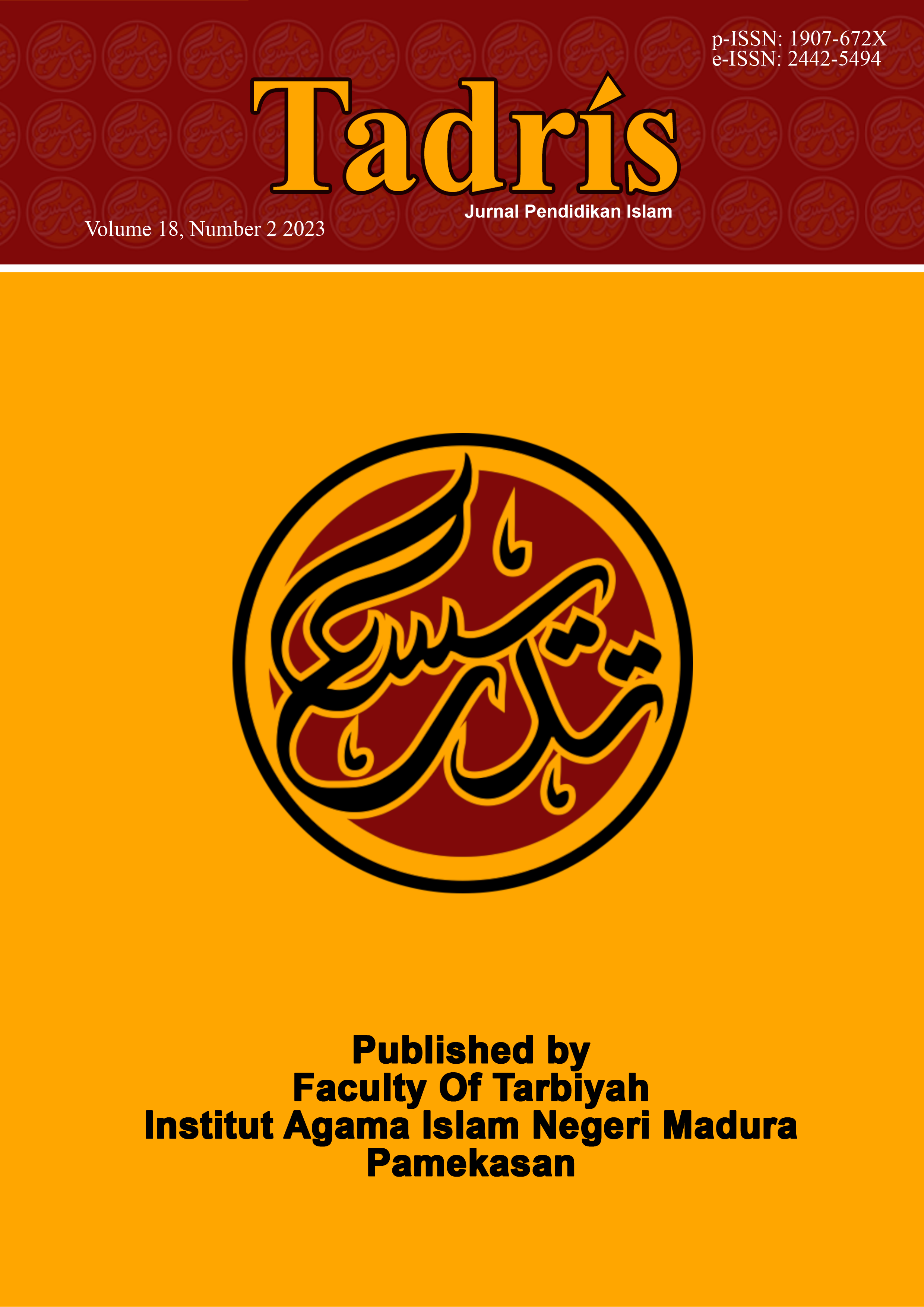Developing Learning Materials of Islamic Education Integrated with Mathematics and Sains for Junior High School
 Abstract views: 138
,
Abstract views: 138
,
 PDF downloads: 106
PDF downloads: 106
Abstract
The design of learning materials and the learning process for Islamic Education subjects is ideally not only normative, but must also be combined with a scientific approach. An understanding of the concept of religion as a whole and integrated will cause students to have a complete world view of religion and science. Therefore, the purpose of this study is to develop learning materials of Islamic Education integrated with mathematics and science for junior high school. This study is research and development which consists of four stages, namely define, design, develop, and dissaminate. The data collecting techniques used are questionnaires to find out experts’ assessment and students’ respons. The results showed that the learning materials has fulfilled the requirements to be considered feasible to be used in the learning process.
Downloads
References
Abdullah, Amin. Implementasi Pendekatan Integratif-Interkonektif Dalam Kajian Pendidikan Islam. Yogyakarta: Pascasarjana UIN Sunan Kalijaga, 2014.
Adnan, S, Dwi Juniati, and Raden Sulaiman. “Student’s Mathematical Representation in Solving Geometry Problems Based on Cognitive Style.” Journal of Physics: Conference Series 1417, no. 1 (December 1, 2019): 012049. https://doi.org/10.1088/1742-6596/1417/1/012049.
Al Makin. Sosialisasi Pembelajaran "Menjadi Mahasiswa Visioner Di UIN Sunan Kalijaga. Yogyakarta: UIN Sunan Kalijaga, 2017.
Amin, Shadiqul, and Nuranisa Rahayu. “Pengembangan Bahan Ajar PAI Berbasis Ensiklopedia Pada Materi Akhlak Di SMA Pancasila Kota Bengkulu.” Manhaj 10, no. 2 (2021): 159–72. http://dx.doi.org/10.29300/mjppm.v10i2.4987.
Assegaf, Abdur Rachman. Filsafat Pendidikan Islam: Paradigm Baru Pendidikan Hadhari Berbasis Integratif-Interconnected. Jakarta: PT Raja Grafindo Persada, 2014.
’Azizah, Fithria Rif’atul. “Mengembangkan Paradigma Integratif-Interkonektif Dalam Pendidikan Islam Di Perguruan Tinggi (Pendekatan Interdisipliner Dalam Studi Islam).” Al-Tarbawi Al-Haditsah: Jurnal Pendidikan Islam 4, no. 2 (2019): 18–34. http://dx.doi.org/10.24235/tarbawi.v4i2.5181.
Mahmudin, Afif Syaiful. “Pengembangan Bahan Ajar Mata Pelajaran Pendidikan Agama Islam Oleh Guru Tingkat Sekolah Dasar.” Journal of Primary Education 2, no. 2 (2021): 95–106. https://doi.org/10.30762/sittah.v2i2.3396.
Muhyi, Abdul. “Paradigma Integrasi Ilmu Pengetahuan UIN Maulana Malik Ibrahim Malang.” Mutsaqqafin: Jurnal Pendidikan Islam Dan Bahasa Arab 1, no. 1 (2018): 45–64. https://doi.org/10.46257/mutsaqqafin.v1i01.24.
Mursyidah, Roihana Waliyyul. “Analisis Kebutuhan Buku Ajar Mata Kuliah Pendidikan Agama Islam Berbasis Strategi Metakognitif.” JOIES (Journal of Islamic Education Studies) 7, no. 1 (2022): 25–32. https://doi.org/10.15642/joies.2022.7.1.25-32.
———. Pengembangan Materi Ajar PAI Berbasis Model Pemaknaan Untuk Meningkatkan Keterampilan Berpikir Kreatif Siswa Sekolah Dasar. Surabaya: UIN Sunan Ampel, 2019.
Nada, Yusrina Qotrun, and Maria Ulpah. “Pengembangan Bahan Ajar Matematika Berbasis Konteks Islami Untuk Meningkatkan Pemecahan Masalah Matematika Siswa Kelas VIII.” Polynom: Journal in Mathematics Education 2, no. 1 (2022): 54–61. https://doi.org/10.14421/polynom.2022.021-04.
Novikasari, Ifada, and Maria Ulpah. “The Development of Islamic Context Learning Materials to Facilitate the Conceptual Understanding of Mathematics.” JTAM (Jurnal Teori Dan Aplikasi Matematika) 6, no. 3 (July 16, 2022): 488. https://doi.org/10.31764/jtam.v6i3.8364.
Polman, Judith, Lisette Hornstra, and Monique Volman. “The Meaning of Meaningful Learning in Mathematics in Upper-Primary Education.” Learning Environments Research 24, no. 3 (October 2021): 469–86. https://doi.org/10.1007/s10984-020-09337-8.
Prastowo, Andi. Panduan Kreatif Membuat Bahan Ajar Inovatif. Yogyakarta: Diva Press, 2015.
Sabiq, Ahmad Fikri. “Pembelajaran PAI Dengan Pendekatan Integratif Pada Masa Pandemi Covid-19 Di SD PTQ Annida Salatiga.” Edutrained: Jurnal Pendidikan Dan Pelatihan 5, no. 1 (2021): 50–58. https://doi.org/10.37730/edutrained.v5i1.132.
Sari, Bitari Widia, and Dedih Surana. “Model Pembelajaran Integratif Untuk Mata Pelajaran Pendidikan Agama Islam Di Masa Pandemi Covid-19.” Jurnal Riset Pendidikan Agama Islam 2, no. 1 (2022): 65–72. https://doi.org/10.29313/jrpai.v2i1.988.
Sugiyono. Metode Penelitian Pendidikan Kualitatif, Kuantitatif, Dan R & D. Bandung: Alfabeta, 2021.
Syafei, Imam. “Pengembangan Bahan Ajar Pendidikan Agama Islam Berbasis Problem-Based Learning Untuk Menangkal Radikalisme Pada Peserta Didik SMA Negeri Di Kota Bandar Lampung.” Jurnal Al-Tadzkiyyah 10, no. 1 (2019): 137–58. https://doi.org/10.24042/atjpi.v10i1.3631.
Ulpah, Maria, and Ifada Novikasari. “Developing Islamic Context-Based Learning Materials in Increasing Students’ Mathematical Understanding.” Al-Jabar : Jurnal Pendidikan Matematika 11, no. 1 (June 24, 2020): 29–38. https://doi.org/10.24042/ajpm.v11i1.5432.
Usman, Sabaruddin Garancang, and Bahraeni. “Pengembangan Bahan Ajar Mata Kuliah Pendidikan Agama Islam Berbasis Kisah.” Inspiratif Pendidikan 8, no. 2 (2020): 301–15. https://doi.org/10.24252/ip.v8i2.11921.
Copyright (c) 2023 TADRIS: Jurnal Pendidikan Islam

This work is licensed under a Creative Commons Attribution-NonCommercial 4.0 International License.
The journal operates an Open Access policy under a Creative Commons Non-Commercial 4.0 International license. Authors who publish with this journal agree to the following terms:
- Authors retain copyright and grant the journal right of first publication with the work simultaneously licensed under a
 Commons Attribution-NonCommercial 4.0 International License
Commons Attribution-NonCommercial 4.0 International Licensethat allows others to share — copy and redistribute the material in any medium or format, and adapt — remix, transform, and build upon the material.
- Authors are able to enter into separate, additional contractual arrangements for the non-exclusive distribution of the journal's published version of the work (e.g., post it to an institutional repository or publish it in a book), with an acknowledgement of its initial publication in this journal.
- Authors are permitted and encouraged to post their work online (e.g., in institutional repositories or on their website) prior to and during the submission process, as it can lead to productive exchanges, as well as earlier and greater citation of published work (see The Effect of Open Access).














